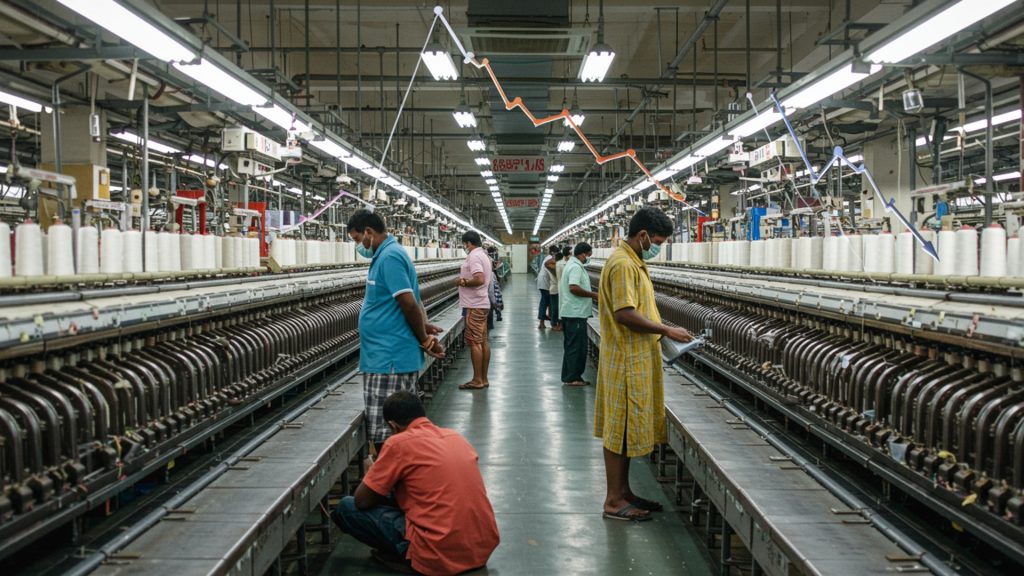Tamil Nadu’s economy faces a serious threat as new tariffs from the United States hit key industries hard, prompting Chief Minister M. K. Stalin to urgently call upon Prime Minister Narendra Modi for immediate financial relief. The sudden economic pressure from these US trade duties, which could increase from 25% to 50%, puts thousands of jobs at risk and strains the state’s vital export sectors, creating a critical situation that demands swift action from the central government. Businesses across the state, especially in textiles, apparel. leather, are already feeling the pinch, raising fears of widespread job losses and a significant slowdown unless urgent measures are put in place to protect the affected industries and workers.
Rising Trade Tensions and Economic Concerns
New tariffs imposed by the United States on various Indian goods have caused serious worry across key export sectors, especially in Tamil Nadu. The US government recently announced a 50% tariff on a range of Indian products, a move that became effective on August 27, 2025. This increase is a significant escalation from previous duties and targets sectors vital to India’s export economy. The tariffs were imposed in two phases, with an initial 25% duty taking effect on August 7, followed by an additional 25% from August 27, bringing the total to 50%. This decision by the US government aims to encourage manufacturing within the US, create jobs. reduce trade deficits, while also linked to geopolitical reasons like India’s continued purchase of Russian oil.
The impact of these tariffs is expected to be widespread, with sectors like textiles, auto components, leather goods, chemicals. marine products facing the highest risk. Experts warn that the higher tariffs will make Indian goods much more expensive in the US market, potentially cutting US-bound exports by 40-50%. This could lead to severe challenges for businesses and significant job losses, particularly in states that rely heavily on exports to the US.
Tamil Nadu Chief Minister Calls for Help
Tamil Nadu Chief Minister M. K. Stalin has expressed deep concern over the increased US tariffs. He has formally asked Prime Minister Narendra Modi for urgent relief to protect Tamil Nadu’s economy and its workforce. In a letter to the Prime Minister, Mr. Stalin highlighted the severe threat these tariffs pose to the state’s industries and employment. He emphasized that Tamil Nadu’s economy relies heavily on exports to the US, making the state especially vulnerable to these new duties.
“This higher dependency on the US market clearly implies that tariff impact on Tamil Nadu will be disproportionately greater than for most other Indian states. Hence this tariff has significant implications for Tamil Nadu’s manufacturing sector and employment scenario,” Chief Minister M. K. Stalin stated in his letter to Prime Minister Modi.
The Chief Minister’s appeal follows discussions with various industry groups from Tamil Nadu, who raised their concerns directly to him. The textile associations, in particular, met with Mr. Stalin and urged the state government to support them in dealing with the 50% US tariff.
Key Industries in Tamil Nadu Face Hardship
Tamil Nadu is a major hub for several export-oriented industries that are now directly under threat from the US tariffs. The textile and apparel sector is one of the most affected. Tamil Nadu contributes about 28% of India’s total textile and clothing exports, with major hubs like Tiruppur and Karur sending large volumes of goods to the US. The state is the largest exporter of textiles to the US from India. The 50% tariff is expected to significantly weaken the ability of Indian textile and apparel exporters to compete with other countries.
Another crucial sector facing hardship is auto components. The US accounts for 27% of India’s auto component exports, which were nearly $7 billion in 2024. The new tariffs, ranging from 25-28% to 45-50%, depending on the product, are set to cause immediate problems. Small and medium-sized businesses (SMEs) that make up a large part of this sector are expected to be hit the hardest. Some larger companies are looking for other markets. smaller firms might have to absorb the tariff costs, which will reduce their profits.
Other sectors in Tamil Nadu that are highly dependent on US exports and face significant exposure include:
- Leather and Footwear
- Gems and Jewellery
- Marine Products, especially shrimp
- Chemicals
According to the Chief Minister, the textile sector alone employs nearly 7. 5 million people in Tamil Nadu. With the current and proposed tariffs, an estimated 3 million jobs are at immediate risk in this sector.
Industry Leaders Speak Out
Industry associations across Tamil Nadu have voiced their worries and called for quick action. The Southern India Mills’ Association (SIMA), representing a large part of the textile industry, met with Chief Minister Stalin to explain the severity of the situation. SIMA urged the Chief Minister to ask the Prime Minister for immediate policy actions.
Dr. S. K. Sundararaman, Chairman of SIMA, stressed that “without immediate intervention, the US tariff impact could be as damaging as the COVID period for Tamil Nadu’s textile sector.”
Industry leaders have pointed out that the new tariffs make trade with the US almost impossible for some products. They fear a sudden stop in trade could lead to serious money problems for many businesses.
Possible Steps and Support Measures
Chief Minister Stalin has outlined several relief measures he wants the central government to consider. These include:
- A two-year break on paying back the main loan amount (principal repayment).
- Providing 30% collateral-free loans under the Emergency Credit Line Guarantee Scheme (ECLGS).
- Offering a 5% interest reduction on loans.
- Removing the 11% import duty on cotton.
- Improving benefits from the Remission of Duties and Taxes on Exported Products (RoDTEP) scheme.
- Speeding up refunds for export duties and Goods and Services Tax (GST) claims.
The state government also recommended speeding up new free trade agreements to lower risks from high tariffs. The Chief Minister has assured industry leaders that Tamil Nadu will work closely with the central government to ensure exporters are not at a disadvantage because of changes in global trade rules.
Looking Ahead
The central government is currently reviewing the situation and the requests from various states and industry bodies. While some reports suggest the overall impact on India’s Gross Domestic Product (GDP) might be small, the effect on specific sectors and states like Tamil Nadu is expected to be significant. The government is working to comprehend the full scope of the challenge and find ways to support affected businesses and protect jobs. The focus remains on maintaining export competitiveness and exploring other markets to lessen the reliance on US trade where tariffs are now a major barrier.

